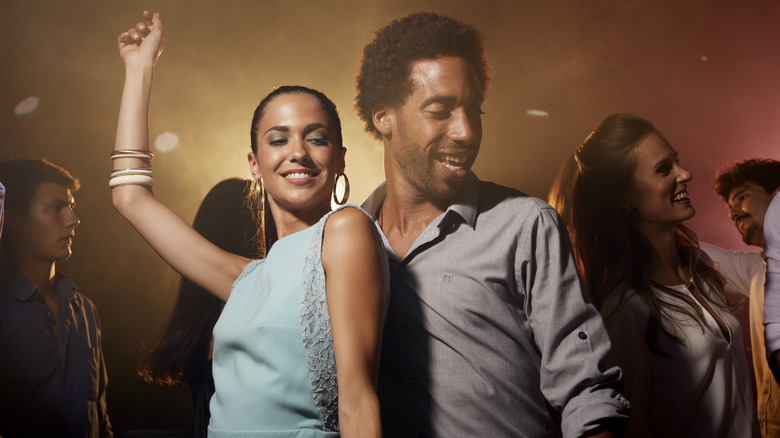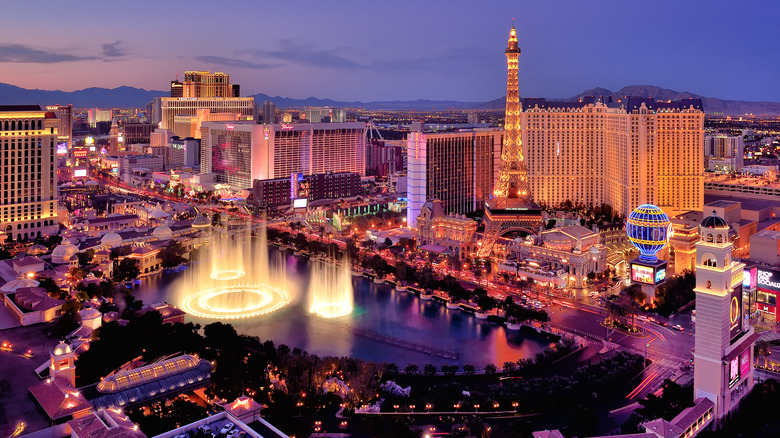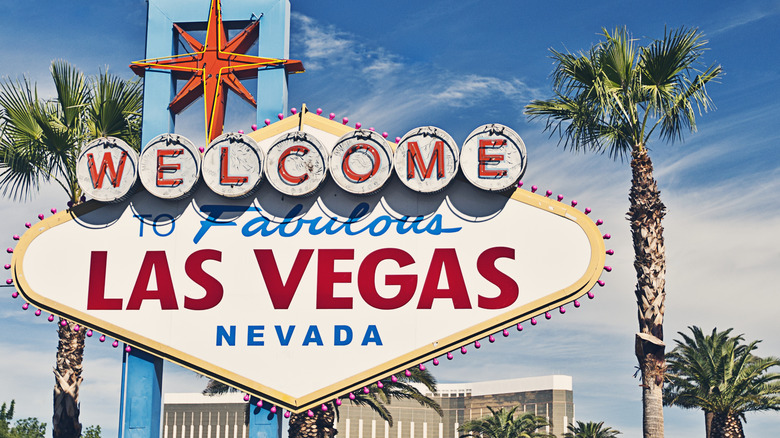One Dynamic City Known For Its Nightlife Is The World's 'Most Stressful' To Visit In 2025
Large cities are often overwhelming and stressful. There are usually more people, the traffic is a lot more congested than in quieter destinations, and constantly navigating crowds can quickly become exhausting. That said, out of all the "big cities" out there, there's a popular U.S. destination that consistently ranks as one of the most overwhelming places to visit: Las Vegas.
In fact, according to a 2025 study by Metro.uk, Sin City scored an alarming 95 points on the stress index. A near-perfect score, Metro's assessment ultimately ranks Vegas as the most stressful destination in the world for tourists, ahead of other large-scale travel hotspots like San Francisco (93), New York City (83), and London (82).
The numbers are pretty clear on why Vegas tops the list. For one, the city suffers from some pretty extreme overcrowding, with a whopping 187,000 visitors per 100,000 residents. As a result, this massive influx of tourists also creates another problem: noise levels recorded at 94 decibels. Just to put that into perspective, anything above 85 dBA for extended periods of time (over eight hours) can lead to hearing loss and damage. Throw in the safety concerns typically associated with high-traffic areas, the abundance of tourist traps dotted around the city, a relentless sensory stimulation, and inflated prices for basic services ($10 for a toothbrush? No thanks!), and it makes perfect sense why it would earn the not-so-coveted title.
The reality of traveling to Las Vegas
With a constant barrage of bright lights, loud noises, ringing slot machines, and bustling crowds, tackling Vegas isn't for the faint of heart. As a famously high-energy destination, the city's intense atmosphere is typically amplified by the sheer volume of things happening simultaneously, which leads to a unique kind of stress that few other destinations can match. After all, Vegas' "bigger is better" philosophy is basically embedded into every aspect — from its lavish hotels and massive casinos to its non-stop entertainment options. And while the bright lights and the excitement of all-day gambling might appeal to first-time travelers hoping to win big, it's the same sensory overload that often destroys any possibility of calm once things get a little too much.
Despite sounding like an exciting escape on paper, the reality of Vegas is that this constant stimulation can quickly start to take its toll on visitors. For one, the dense crowds and traffic hazards make walking down the Strip a dangerous exercise of dodging groups, avoiding distracted drivers, and skipping around street performers. Beyond that, most popular attractions — like celebrity chef restaurants and live shows — also involve long wait times and premium prices for what's often considered a pretty rushed (and sometimes underwhelming) experience.
As for casino experiences, things aren't much better on the inside. By design, most Vegas casinos don't have any clocks or windows — which creates a disorienting environment that makes it easy to lose track of time and money. Additionally, the constant availability of alcohol at all hours of the day can also lead to some pretty poor decision-making and impaired judgment, which ultimately leads to an even more intense feeling of (hang)anxiety and fatigue that plenty of visitors report even after short stints in the city.
Planning a less stressful visit to Vegas
Luckily, and despite its reputation, there are still ways to experience Las Vegas without necessarily getting swallowed whole by the stress. The best way to achieve this is by timing your visit strategically and planning a trip around the city's shoulder seasons. Specifically, this means heading there from March to May, when the temperatures aren't too hot, or from September to November, when you'll run into fewer crowds and more reasonable prices.
Whatever you do, though, make sure you avoid traveling to Vegas during the summer months (June to August). Not only will the heat be absolutely brutal — with temperatures regularly exceeding 110 degrees Fahrenheit — but you'll also get stuck with higher accommodation prices because of increased visitors. Similarly, you'll also want to steer clear of major events like New Year's Eve and big convention weeks, when the city gets even more crowded and expensive.
Along with that, ensuring a good Vegas experience also means that you'll want to plan for some downtime and recovery. A great way to do this is to book your accommodation slightly away from the Strip, where you can unwind and even enjoy other activities that aren't gambling. Transportation-wise, free shuttle services to some of the city's most popular spots are also readily available, which means that you'll never be too far away from the action (without the need to be right in the middle of it, either). Finally, setting clear time and budget limits for all things gambling, drinking, and entertainment can also help you maintain a more laid-back approach that doesn't leave you broke and exhausted.


